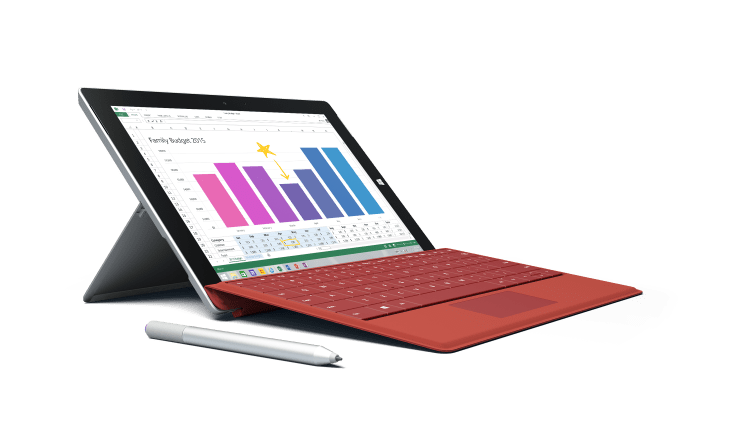Microsoft today unveiled the Surface 3, the successor to the Surface 2 and the thinnest and lightest tablet the company has ever shipped. Instead of sporting Windows RT like its predecessor, the Surface 3 runs a full copy of Windows 8.1 (64-bit). This is likely why it is priced slightly higher, starting at $499 (compared to $449).
There are four price points in total. The Surface 3 goes for $499, while the Surface 3 with 4G LTE is an extra $100 at $599. Both come with 2GB of RAM and 64GB of storage, but you can double up to 4GB of RAM and 128GB of storage for another hundred bucks: $599 for just Wi-Fi or $699 for 4G LTE.
https://www.youtube.com/watch?v=vPto6XpRq-U
The Surface 3 is available for preorder today via the Microsoft Store, both retail and online, as well as select retail stores in 26 countries. Those same retailers and resellers will offer the Surface 3 for purchase starting on May 5. Microsoft is promising availability will expand that weekend in all 26 countries, making the device and its accessories available broadly by May 7.
The full list of launch countries is as follows: Australia, Austria, Belgium, Canada, Denmark, Finland, France, Germany, Hong Kong, Ireland, Italy, Korea, Luxembourg, Malaysia, the Netherlands, New Zealand, Norway, Portugal, Singapore, Spain, Sweden, Switzerland, Taiwan, Thailand, the U.K., and the U.S. Microsoft also confirmed the Surface 3 (4G LTE) will be available through T-Mobile and Verizon in the U.S. “later this year.”
Hardware
Powered by a quad-core Intel Atom x7 processor, which Microsoft points out is the highest-performing processor within the Intel Atom processor family, the Surface 3 can feature a fanless design, unlike the Surface Pro 3. The device has a ClearType HD multitouch display with a 3:2 aspect ratio (1920×1280 resolution).
The Surface 3 features stereo speakers with Dolby Audio-enhanced sound, a microphone, two 1080p HD cameras (8MP rear-facing and 3.5MP front-facing), and a three-position kickstand. Connectivity includes Wi-Fi (802.11 a/b/g/n/ac), Bluetooth 4.0 low energy, and of course 4G LTE for those who are willing to spend an extra $100 (plus data plan).
As for physical connectivity, the Surface 3 offers a full-size USB 3.0 port, a Mini DisplayPort, a microSD card reader, and a Micro USB charging port (translation: you can use most smartphone chargers to recharge this tablet). It is compatible with the Surface Pro line of adapters so you can use it with the existing line of accessories.
Microsoft is also rolling out two new accessories today:
- Surface 3 Type Cover, featuring an improved trackpad and the Surface Pen (silver, black, blue, and red), is $130.
- Surface 3 Docking Station, featuring connections to an external monitor and all your desktop devices, is $200.
- Surface 3 Screen Protector and Surface 3 Power Supply are also available separately for $50 and $40, respectively.
The Surface 3 weighs 1.37 pounds (622 grams) and has the following dimensions: 10.51 x 7.36 x 0.34 inches (267 x 187 x 8.7 millimeters). Last but certainly not least, Microsoft is promising up to 10 hours of video-playback battery life.
Software
The Surface 3 may ship with Windows 8.1, but users will be able to upgrade to Windows 10 for free when the latest and greatest ships this summer. This is the same deal offered to existing Windows 7 and Windows 8.1 users: Surface 3 owners also have one year to upgrade to Windows 10 for free.
The Surface 3 comes with a one-year subscription to Office 365 Personal, which includes Word, Excel, PowerPoint, Outlook, and OneNote. Office 365 Personal also includes 1TB of OneDrive storage, though a subscription renewal will cost you $70 per year.
Who is it for?
Microsoft describes the Surface 3 as being similar to the Surface Pro 3 in that “it’s a tablet that can replace your laptop” but notes that it is “thinner, lighter and even more affordable.” In other words, this isn’t aimed at the business worker, but the average consumer.
More specifically, the company is positioning the device at students and employees in various industries. In fact, Microsoft has already started striking deals with companies and educational institutions interested in offering cheap tablets to employees and students.
“Surface 3 brings what customers love about Surface Pro 3 to more people, delivering the premium design and productivity of Surface in a more affordable device,” Panos Panay, corporate vice president of Microsoft Surface, said in a statement. “We’ve taken everything we learned making Surface Pro 3 and poured that innovation into this newest Surface.”
In short, the Surface 3 is Microsoft’s third attempt at a cheap tablet that can double as a laptop. We’ll reserve judgment on whether the third time’s the charm until we can get our massive hands on the small device.



